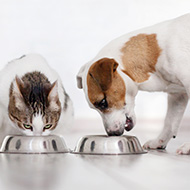Government urged to scrap VAT on pet food

More than a quarter of owners are concerned about the growing expense of dog food.
Dogs Trust has called on the Government to remove VAT from pet food in a bid to help struggling pet owners this winter.
The charity has written to Chancellor Jeremy Hunt, asking the Government to recognise that rising dog food prices are contributing to “the country’s biggest animal welfare crisis for generations.”
It comes after Mr Hunt announced a £55 billion package of tax rises and spending cuts “to rebuild the public finances.”
As pet owners battle with the cost-of-living-crisis, Dogs Trust has already received an unprecedented amount of requests from individuals struggling to keep their dogs; the charity saw close to a 50 per cent rise this year in handover inquiries compared to 2021, and it fears that this could hit 50,000 inquiries by the end of December.
Dogs Trust chief executive Owen Sharp said that a 20 per cent cost reduction could prove critical to many owners, and will offset spiralling prices to keep pet food affordable.
“With an estimated 12 million dogs in the UK, we think it’s only right the government should help offset the price of seeing this nation through the worst animal welfare crisis since the war, by cutting the 20 per cent VAT on pet food,” he said.
“With record numbers of people unable to afford their dogs, our priority is to keep dogs and families together. At Dogs Trust we’re doing all we possibly can but, Mr Hunt, we are calling on your help for the unseen victims of the cost-of-living crisis - our nation’s dogs.”
The most recent monthly survey of dog owners in the UK, conducted by YouGov on behalf of Dogs Trust, indicates that more than a quarter (23%) of owners are concerned about the growing expense of dog food.



 BSAVA is to partner with BVA Live (11-12 June 2026) to champion clinical research.
BSAVA is to partner with BVA Live (11-12 June 2026) to champion clinical research.